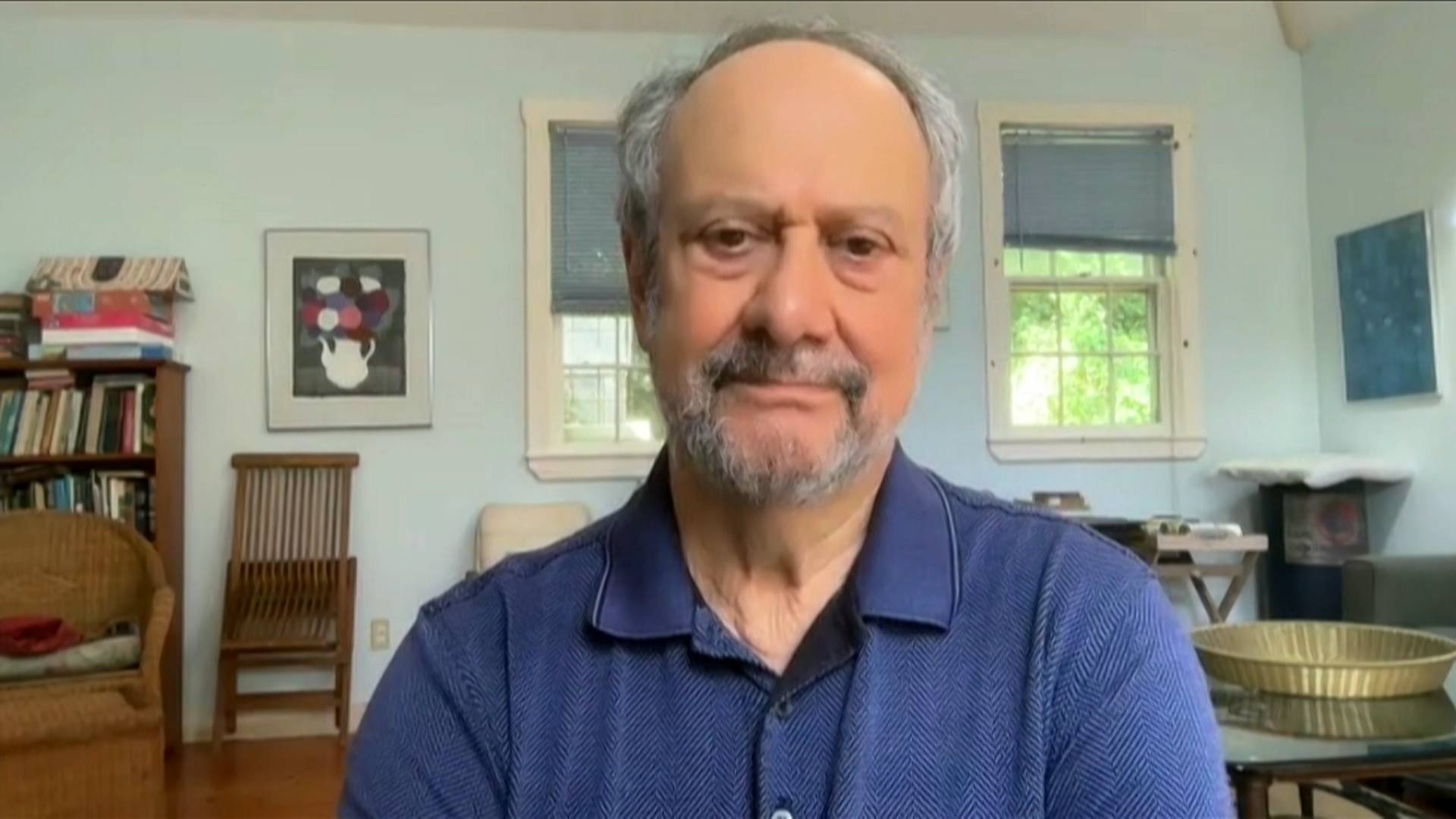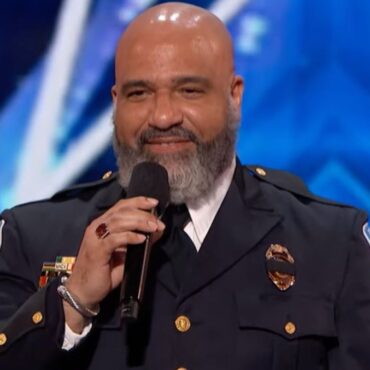This is a rush transcript. Copy may not be in its final form.
AMY GOODMAN: This is Democracy Now! “War, Peace and the Presidency.” We are “Breaking with Convention.” I’m Amy Goodman.
Donald Trump has tapped freshman Ohio Senator J.D. Vance to be his running mate. Trump and Vance were officially nominated on Monday on the opening day of the Republican National Convention.
BERNIE MORENO: It is a great honor to move that J.D. Vance be nominated by acclamation by this Republican National Convention as its candidate for the office of vice president of the United States of America.
AMY GOODMAN: J.D. Vance, who’s 39, first gained fame as the author of the best-selling memoir Hillbilly Elegy: A Memoir of a Family and Culture in Crisis about growing up in Appalachia. The book was also made into a movie. Vance is a graduate of Yale Law School who served in the Marines and became a venture capitalist.
He was also a Never Trumper, who once called Trump “America’s Hitler,” “reprehensible,” “cultural heroin” — as in the drug — “noxious,” “a terrible candidate.” But Vance later shifted and became an ardent supporter of Donald Trump.
Vance won a close Republican Senate primary in 2022 in part thanks to billionaire tech investor Peter Thiel, who spent a record-breaking $10 million to support Vance’s campaign.
Earlier this year, J.D. Vance appeared on ABC and told George Stephanopoulos, if he had been vice president in 2020, he would not have certified the results of the 2020 election.
GEORGE STEPHANOPOULOS: Would you have certified the election results, had you been vice president?
SEN. J.D. VANCE: If I had been vice president, I would have told the states, like Pennsylvania, Georgia and so many others, that we needed to have multiple slates of electors. And I think the U.S. Congress should have fought over it from there. That is the legitimate way to deal with an election that a lot of folks, including me, think had a lot of problems in 2020. I think that’s what we should have done.
GEORGE STEPHANOPOULOS: So, it’s very clear: You would have done what Donald Trump asked you to do there, not what Vice President Mike Pence did. You said that that’s about the past. But, of course, Donald Trump —
SEN. J.D. VANCE: No, no, George. George, it’s — no, no, George, it’s not about what —
GEORGE STEPHANOPOULOS: Well, that’s what you just said.
SEN. J.D. VANCE: It’s not about what — it’s — George, it’s not about what Donald Trump asks somebody to do. It’s about: What do we do when you have a problem like what happened in 2020?
AMY GOODMAN: To look more at J.D. Vance’s record and economic policies, we’re joined now by Robert Kuttner, co-founder and co-editor of The American Prospect, his recent piece headlined “Trump’s VP Reveal.” Kuttner’s latest book is titled Going Big: FDR’s Legacy, Biden’s New Deal, and the Struggle to Save Democracy. He’s also a professor at Brandeis University’s Heller School.
Robert Kuttner, welcome back to Democracy Now! Can you —
ROBERT KUTTNER: Thank you for having me.
AMY GOODMAN: — tell us who J.D. Vance is and the significance of Donald Trump choosing him, who would be the youngest-ever vice president if he were to win, at the age of 39, the former marine and venture capitalist?
ROBERT KUTTNER: Well, he’s a very dangerous fake. And his whole history, from writing Hillbilly Elegy to doing a 180-degree pivot from being a critic of Trump to being a loyalist to Trump, to pretending to be very favorable to working Americans, when in fact all of his votes have been the opposite, suggests both that he’s a fake, and he’s an attractive fake. He’s personally likable. I hate to say that. He’s an intellectual. He knows how to engage issues. He knows things that Trump is completely ignorant of. He’s young, whereas Trump is old. And when I wrote this piece yesterday morning, before Trump had made his selection, I wrote that if Trump is shrewd, he will name J.D. Vance, but I’m not sure that Trump’s own narcissism will let him do that, because the risk for Trump is that Vance will upstage Trump.
And let me say a word or two about Hillbilly Elegy, because this was a classic case of bait-and-switch. So, the story is that he’s got a dysfunctional family, they move from southern Ohio to Kentucky, and supposedly the book is expressing great compassion for his kin and his neighbors. But the actual message of the book is that if you’re not doing well in Kentucky, it’s because of your own bad behavior. You’re taking too many drugs. You’re selling your food stamps. You’re not able to hold a job. You’re not doing right by your children. It’s the old conservative narrative that poverty is the fault of the poor. It’s all behavioral. It’s not structural. It’s not industry being outsourced or the coal mines closing. No, it’s just your behavior is bad. And, you know, the right-wing foundations invested in a guy called Charles Murray, who wrote a book in the ’80s called Losing Ground, which basically said that poverty is the fault of the War on Poverty, and poverty is the fault of the welfare system, and poverty is the fault of spoiling the poor. And in the review that I wrote of his book, I described Vance as “Charles Murray with a [bleep]-eating grin.” And when I met Vance at a conference the following year, he quoted that line back to me and engaged intellectually and was very self-reflective and thoughtful and likable. And I said to myself, “Uh-oh, this guy is really going to be trouble.”
And so, what they did last night, they repositioned the Republican Party as the party that’s pro-worker, even though this is complete nonsense. But because Vance is so adept at these head fakes, and because he’s got this fake compelling life story, he’s the ideal guy to try and represent that. And they were so cynical, they even put Sean O’Brien on the program, who sort of threaded the needle between talking about what we needed to do to give unions a fighting chance, without quite mentioning that Biden was the one who was in favor of this, and it was the Republicans who were blocking this. This is very clever on the part of Republicans to reposition themselves, at least for the purpose of the convention, and maybe for the campaign, from being the party of hatred to being the party that cares about workers. It’s nonsense, but Vance is a very good symbol of that. And that’s why he’s so dangerous.
And, you know, normally, it really doesn’t matter who the vice president is. You have to go all the way back to 1960 to point to a vice president, Lyndon Johnson, who really made a difference in an election outcome. He helped Kennedy carry Texas and maybe won the election. But other than that, the vice president doesn’t matter very much. In this case, where you’ve got very closely fought races in Wisconsin and in Michigan and in Ohio — well, not Ohio, but Ohio where Sherrod Brown is concerned, anyway — and western Pennsylvania, Vance could actually make a difference.
The only silver lining — and I hate to call this a silver lining — is it makes it even more urgent for the Democrats to find somebody more effective than Biden who can beat these guys. And I think once the hoopla from the Republican convention dies down, you know, by next weekend, that’s going to be the takeaway, that we are really screwed if we can’t find somebody who can beat this ticket — and the ticket is beatable. You just need a stronger candidate than Biden.
AMY GOODMAN: You mentioned the Teamsters President Sean O’Brien. This was very significant. It was the first time a Teamsters president addressed the Republican National Convention. It was the first night of the convention. President Trump and his vice-presidential nominee, J.D. Vance, were sitting next to each other in the audience. The Teamsters president gave something like an 18-minute final speech. This is a clip.
SEAN O’BRIEN: I travel all across this country and meet with my members every week. You know what I see? An American worker being taken for granted, workers being sold out to big banks, Big Tech, corporatists and the elite. And I’m not the only one who sees this. Everyday families see it. The American people aren’t stupid. They know the system is broken. We all know how Washington is run. Working people have no chance of winning this fight.
That’s why I’m here today, because I refuse to keep doing the same things my predecessors did. Today — today, the Teamsters are here to say we are not beholden to anyone or any party. We will create an agenda and work with a bipartisan coalition, ready to accomplish something real for the American worker. And I don’t care about getting criticized. It’s an honor to be the first Teamster in our 121-year history to address the Republican National Convention.
AMY GOODMAN: So, that was Teamsters President Sean O’Brien in this rousing address to not the Democratic National Convention. Apparently, he asked to address both conventions. Only the Republicans, he said, got back to him. Robert Kuttner, you’re co-founder and co-editor of The American Prospect. Your response, as he talked about what we just heard, he talked about economic terrorism, he called out corporations like Amazon? You say that J.D. Vance is anti-worker. Explain what the role of the Teamsters president is here. I know there’s a lot of dissent within the Teamsters for him giving this address.
ROBERT KUTTNER: Well, it was pretty cynical of O’Brien. I mean, on the one hand, it gave him a platform to give a very pro-worker speech. On the other hand, there’s no bipartisan coalition on behalf of raising the minimum wage or strengthening worker organizing rights or strengthening the NLRB or any of the other things on the pro-worker agenda. The only people who are supporting that are Democrats. And even someone like J.D. Vance, who does head fakes as a kind of a pro-worker guy, he’s not voting for this stuff, either.
So, you know, to some extent, this was in the Teamster DNA. You know, there were points when Jimmy Hoffa backed Republicans. And it’s a union over the years that’s been fairly opportunist politically. And I guess O’Brien is gambling that, A, this gives him a platform; B, if these guys get elected, he’s going to have some relationship with them — they sort of owe him a favor. I don’t think it was a great idea. But at least it tested out some themes on a Republican audience and demonstrated the awkwardness of Republicans claiming to be pro-worker, because if you dig a little bit beneath the surface, the Republicans are against every one of these things. And I’m hardly the only commentator who’s going to point that out.
AMY GOODMAN: But, Robert Kuttner, if you could say how they’re against it? Show, through their records — Vance, a senator, of course, Trump, former president, — how they’re anti-worker, because this right-wing populist appeal, the Teamsters president addressing, seeing the reactions of the presidential and vice-presidential candidate, was very powerful.
ROBERT KUTTNER: Well, you look at everything, from Biden’s executive orders that make it easier for workers to organize, to Biden’s executive orders requiring federal contractors to pay a living wage, to decisions by the NLRB on unfair labor practices, to raising the minimum wage, to defining Uber and Lyft workers as regular employees. I mean, you go down the entire litany of things that unions want, the Republicans have opposed every one of them, either in court or by statute or in reported votes or Republican appointees on regulatory commissions.
And although Vance once walked a picket line with the UAW, he has not done anything to support the labor agenda. It’s all image. It’s all fakery. It’s all political stunts. And the more that comes out into the open, the more people realize that the Republican effort last night to present itself as the pro-worker party is nothing but posturing. And they need to be held to account on that. It should be a very major issue in the campaign. The more Republicans try and make their alleged pro-worker stance a high-profile posture, the more they need to be held to account.
AMY GOODMAN: If people were just reading the script of Sean O’Brien’s speech, it could have been one given by, oh, independent Senator Bernie Sanders. Are the Democrats at risk here of dismissing this level of right-wing populism? And can you talk about why it appeals so much, especially in the states, the battleground states of Ohio and Pennsylvania and Wisconsin, where we are right now?
ROBERT KUTTNER: Well, what’s truly dangerous about Vance, if you compare Vance with Trump — so, the Trump of 2016 posed as a populist, but it was cultural or social or racist populism — it’s all the fault of Mexicans, it’s all the fault of immigrants, it’s all the fault of, you know, DEI. This was a kind of an attempt to play into the feeling of white working-class people that they have been disrespected. And it was a racist, nationalist, cultural brand of fake populism.
Now, what Vance brings to this is he tries to add economic populism: Not only are we going to seal up the Mexican border, but we’re actually going to help you earn a living wage. And Trump didn’t really do that, other than raising tariffs on Chinese goods and being anti-China. Trump didn’t follow through on that. It was left to Biden to complement the tariffs with a real industrial policy. Trump was opposed to that. Whereas Vance is much more effective at connecting Trump’s cultural and social and racist populism to what looks like pocketbook populism, except it’s a fake, so that if you’re a worker in Wisconsin or Ohio or Pennsylvania, and your living standards have gone to hell, and you can’t send your kid to college because your child would have to go into debt, and you can’t afford to buy a house, and your health insurance is going down the drain — those are pocketbook issues. And to the extent that Vance talks a good game on pocketbook issues, that shores up Trump’s rather thin cultural populism. So, it’s dangerous.
And I come back to the fact that the Democrats have got to do better than Biden, if they’re going to contest this. I mean, Biden has done great stuff, but the number of Americans who think he’s too old, he’s too fragile, he’s too feeble, the fact that he can’t keep his lines straight, and the fact that Vance, by the way, is an excellent debater. And we’ve got to do better than the current Democratic ticket, or these guys are going to win. And they’re cynical enough to carry out all their threats. And we really will cease to be a democracy, and you can change the title of your program to Democracy Then.
AMY GOODMAN: I want to turn to a few of the responses last night. It was right after J.D. Vance was announced as the vice-presidential candidate. Again, he would be, if he won, the second-youngest vice president in U.S. history. I spoke to Republican House speaker, the former speaker, Kevin McCarthy of California, serving as a delegate to the convention.
AMY GOODMAN: Mr. McCarthy, your thoughts on J.D. Vance?
KEVIN McCARTHY: I think it’s a great pick. I mean, I think J.D. will be able to go places that you don’t really normally see Republicans. I think he’ll be great in Pennsylvania and in Michigan and in Wisconsin. And, you know, we’ve got to win one of those three to be able to win, where we are. I think his work as a — in the Marines, his economics, I mean, his youthfulness, I think it’s going to be a great addition. Great team.
AMY GOODMAN: What do you think of him having called Trump “America’s Hitler”?
KEVIN McCARTHY: I think that was a long time ago, and he’s learned something new. I think you’re going to find a lot of people that maybe voted against President Trump 2016 that are going to be supporting him now.
AMY GOODMAN: Not far from the former House Speaker McCarthy, I spoke to California Republican Delegate Lisa Moreno.
AMY GOODMAN: What is your name?
LISA MORENO: Lisa Moreno.
AMY GOODMAN: And where do you live in California?
LISA MORENO: Madera County.
AMY GOODMAN: What do you think of the choice of J.D. Vance?
LISA MORENO: He’s going to represent our platform incredibly well. President Trump has chosen him, and we are going to support him 100%. That’s what we are. We’re a unified party. And we’re in it to win it. We’re taking care of business, and we’re taking our country back.
AMY GOODMAN: So, let me ask you something. J.D. Vance said, “Trump makes people I care about afraid. Immigrants, Muslims, etc. Because of this I find him reprehensible. God wants better of us.” Vance said this on Twitter a few years ago. What are your thoughts about that?
LISA MORENO: First of all, I proudly represent being Latina and being Republican. So, our party welcomes everyone, from all walks of life, from all backgrounds. I have heard so much rhetoric from other people that are not Republican say to me, “I don’t identify with my party anymore. They’re on the opposite side of the spectrum. I need to find a home.” And I say to them, “Our arms are open, and welcome. Why else do you want to come over?” And they say, “We’re tired of the last four years. We don’t like what it feels like. We want to go back.” And they’re not Republican. They’re Latinos. They’re Black. They’re Asian. They’re Indian. They’re coming to us without us having to go, well, ask them to come over and tap them on the shoulder. But we have our arms very much open to them.
AMY GOODMAN: But it’s J.D. Vance who was saying this, that “President Trump makes people I care about afraid,” like immigrants.
LISA MORENO: Right. It was Kamala Harris that said to Joe Biden on the debate stage that she was Black, and she was asked to go sit at the back of the bus, or there was discrimination in her time or segregation. And she’s his vice president.
AMY GOODMAN: What are you hoping will come out of this convention?
LISA MORENO: I’m sorry?
AMY GOODMAN: What do you hope will come out of this convention?
LISA MORENO: We’re already unified. We’re already ready to take our country back. What I’m hoping to see out of this convention is that the whole world to see a unified party like never before. After the attempted assassination of a husband, a father and a fearless leader, the world and the United States and everybody, from all colors, walks of life, saw the division in our country. And people that were not going to vote for Trump are now voting, because they’ve had enough. A lot of people have had it.
AMY GOODMAN: That was California Republican Delegate Lisa Moreno, straining over the music on the floor of the Republican National Convention here in Milwaukee at the Fiserv Center. Robert Kuttner, if you can respond, whether J.D. Vance was attacking Trump around discrimination against immigrants or had called him “America’s Hitler,” the response of the Republicans? And this goes also to the dissent within the Democratic Party right now and the pushing for Biden to step aside.
ROBERT KUTTNER: You know, there’s one interesting crack in the Republican unity. Rupert Murdoch and The Wall Street Journal tried very, very, very hard to discourage Trump from naming J.D. Vance. And I think the reason is that — twofold. First of all, Wall Street Journal is very neocon in its foreign policy. It’s kind of, you know, America needs to police the world. And secondly, The Wall Street Journal is very corporate. To the extent that Vance is something of an economic populist, or at least poses as one, he doesn’t represent the corporate wing of the Republican Party. And to the extent that he’s criticized America’s help of Ukraine to fend off Russia’s invasion, he is feared to be isolationist. So, the corporate wing of the Republican Party doesn’t like him. And he’s actually pivoted on a couple of interesting things. He defends Social Security. So, they’re very good at paying attention to the things that ordinary working people care about, without moving more than a couple of inches in that direction. And I think that’s what makes him so dangerous.
And that’s why the Democrats, once the hoopla of the Republican convention is over, you’re going to see this talk about, “Boy, do we have to get Biden out of there,” resume very, very quickly. For now, in the aftermath of the assassination attempt, there’s politeness. There’s unity. They pulled the commercials. But you’re going to see this roaring back to life. And I certainly, for one person — I certainly hope it does.
AMY GOODMAN: Robert Kuttner, I want to thank you for being with us, co-founder and co-editor of The American Prospect. We’ll link to your piece, “Trump’s VP Reveal.” Kuttner’s latest book, Going Big: FDR’s Legacy, Biden’s New Deal, and the Struggle to Save Democracy.
ROBERT KUTTNER: Thank you.











Post comments (0)